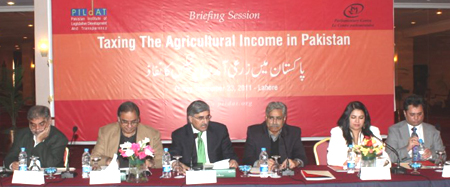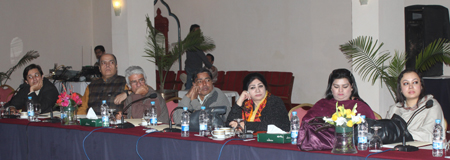|
|
| |
| EVENTS |
|
|
> PILDAT holds Briefing Session for Punjab MPAs on Taxing the Agricultural Income
|
|
|
| |
Lahore, December 23; In a PILDAT Briefing Session on Taxing the Agricultural Income, Punjab Assembly members were briefed by experts on various pros and cons of taxing the agricultural income. |
|
| |
Farmers are aware of their responsibilities and want to pay their taxes, but existing tax system needs to be reformed, Chaudhry Zaheer Uddin, MPA (PML; PP-55, Faisalabad V) and former Leader of the Opposition in the Punjab Assembly.
|
|
| |
Speaking at the Briefing Session Ms. Huzaima Ikram, Advocate High Court and Editor �Tax Review� said that the Agriculture Tax according to the Constitution is a provincial subject and the Provincial Assemblies should develop a mechanism to collect the Agriculture Tax effectively. Dr. Ikramul Haq, Advocate Supreme Court, and International Tax Counsel, was also of the opinion that the Agriculture Tax should be defined according to Article 162 of the Constitution. The tax should be levied on the net income, he opined. |
|
| |
Dr. Tariq Bucha, President Farmers Associates Pakistan briefed the members about the current status of the Agricultural Tax and its collection. He said that the provincial governments have failed to develop an effective mechanism for the collection of the Agricultural Tax. He said the tax is being collected by the Patwaris from the farmers, who do not issue any receipts or tax Challans to the farmers against the payments made. This was causing a huge loss to the exchequer and the notion that the farmers do not want to pay taxes is taking roots. He said that farmers understand the need of paying taxes and want to contribute towards the national development. Only difference is on the collection mechanism. Dr. Tariq Bucha also presented suggestions to improve the tax collection. He said that the government should remove bottlenecks in the tax collection. Farmers should have more excess to the financial resources and should be provided soft agricultural loans. |
|
| |
Mr. Muhammad Mohsin Leghari, MPA (PML; PP-245, Dera Ghazi Khan � VI) was also of the opinion that the government has failed to implement and collect taxes from the farmers. He said that agricultural economy was the most documented in Pakistan but the government has not capitalized on it and has consistently lacked the will to implement the taxes inspite of the farmers being willing to pay taxes. |
|
| |
Chaudhry Zaheer Uddin, MPA (PML; PP-55, Faisalabad V) in closing remarks said that the notion that the farmers do not want to pay their taxes should be dispelled. Successive governments have not been able to implement the collection mechanism. He emphasized that the government can start collecting the exisisting tax by improving the collection system so that the agriculture sector can contribute towards national development. |
|
| |
The briefing session was followed by an active question answer session. MPAs also argued that since a majority of the Assembly members have agricultural background, the perception in public is developing that Assemblies are protecting their own interests which is counter-productive. |
|
| |
MPAs who joined the discussion included Dr. Ghazala Rana, (PML-N), Ms. Nasim Nasir Khawaja (PML-N), Mr. Muhammad Mohsin Khan Leghari, (PML; PP-245, Dera Ghazi Khan � VI), Ms. Saima Aziz (PML-N), Ms. Raheela Khadim Hussain (PML-N), Chaudhry Zaheer Uddin,(PML; PP-55, Faisalabad V), Muhammad Awais Aslam Midhana (PPP;PP-31,Sargodha IV), Ms. Safina Syma Khar (PPPP), Muhammad Khurram Gulfam (PML-N, PP-162; Sheikhupura �I), Rana Muhammad Afzal Khan, (PML-N; PP-66, Faisalabad XVI), Ms. Afshan Farooq (PML-N), Ms. Anjum Safdar (PML-N), Mr. Muhammad Rafique (PML-N;PP-90, Toba Taek Singh �VII). |
|
| |
Earlier, Mr. Ahmed Bilal Mehboob, Executive Director, PILDAT said that Pakistan faces abysmally low tax-to-GDP ratios varying between 9 � 11%. Presently calculated at 9.2%, and especially compared to peer countries and to the region, this percentage is the lowest in the world. This scenario has led to the need for urgent re-thinking and reforms in current tax policies as well as addressing deficiencies in the tax administration system. The need to tax agricultural income, just like any other income in the country, has also fuelled the debate on how to tax the agricultural income. Since the right to collect agricultural income tax lies exclusively with the provinces, provincial legislators need to lead an informed discourse on taxing the agricultural income in Pakistan. Like most divisive issues, there is an urgent need to develop a political consensus on this issue which needs to be led by public representatives. This is only possible through an informed debate following which the provincial legislators can recommend and oversee practical reforms required in taxing the agricultural income. The PILDAT Briefing Session has been organised with that objective.
He also shared that PILDAT has developed two Briefing Papers on Taxing the Agriculture Income aimed at crystallizing the issue and its various facets so as to facilitate an informed discourse among MPAs. Both papers are available in Urdu and English languages.
This Briefing Session has been organised by PILDAT under the Parliamentary and Political Party Strengthening Project II which is funded through Canada's Department of Foreign Affairs and International Trade (DFAIT). The project is implemented jointly by the Parliamentary Centre, Canada and PILDAT. |
|
| |
|
|
| |

|
|
| |
|
|
| |

|
|
|
|
|
|
|
|
|